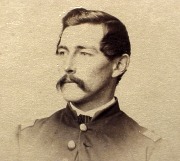| Corn Letter #1 | Soldiers Letter Index | 16th OVI Home Page |
Cumberland Gap, Tennessee - June 24, 1862
to the Holmes County Farmer newspaper at Millersburg, Ohio
Published July 17, 1862
The following is a transcription of a letter written by then 2nd. Lt. Silas H. Corn, Company B, to the Holmes County Farmer newspaper. The transcription was kindly provided by website contributor John M. Pierson. Spelling and grammatical corrections were not made.
In this letter Lt. Corn describes the events and actions taken to approach and occupy Cumberland Gap. The Confederate forces were under the belief the Union force under Gen. George W. Morgan was much larger than it was. Additionally, brilliant maneuvering caught the occupying Rebels off guard and they decided to abandon the strongly fortified Gap without a battle, leaving it for the taking by the Union. Lt. Corn goes on to describe what they found at the Gap left by the fleeing Rebels.
Lt. Corn indicates he wrote the letter from Cumberland Gap, Kentucky, however, it is likely the regiment was still camped on the Tennessee side as it did not move to the Kentucky side until several days later.
 |
ARMY CORRESPONDENCE. From the 16th Regiment.
EDITORS OF THE FARMER: -- Long ere this the telegraph has made known to you the events which have been transpiring in this Division within the last two weeks. But thinking that perhaps some of your readers would desire a more detailed account of our movements than is contained in mere telegraphic reports, I will endeavor to supply that want by a communication to your paper. On Saturday the 7th inst., the Brigades of DeCourcey and Beard started from Cumberland Ford, designing to cross the Cumberland Mountain at what is called Wilson's Gap, a point about 20 miles south-west of this. The artillery preceded us one day, but Gen. Carter's Brigade was detained a few days for want of transportation. After a march of three days we arrived within five miles of the mountains, where there were two companies detailed from each regiment in DeCourcey's Brigade to take possession of the passes over the mountains, through which we intended to pass. The expedition was put under command of Lieut. Col. Pardee of the 42d and Major Keshner of the 16th Ohio. We arrived at the top of the mountain about 10 o'clock at night, and having taken possession of its passes and established our picket posts, we wrapped ourselves in our blankets and tumbled down for a nap. The mountain was unoccupied by rebel troops. The night was beautifully lit up by the moon shining through an unclouded sky. Our success was all that we could have desired, and more than we anticipated; and all that remained for us to do was to quietly await the approach of morning, to see what daylight would reveal. Having awoke quite early in the morning, I walked out to one of our picket posts, which was place down on the mountain commanding the road as it turned its course into the Gap, and was just in time to witness the capture of three horses, and the skedaddle of their rebel riders. They were Secesh Cavalrymen, who had unconsciously approached our pickets; they were haulted by our men, and not displaying a disposition to obey, but immediately dismounting and were making good their escape when they were fired on without further injury to them than the wounding of one of them in the hand, and the loss of their arms and horses. Thinking that we were simply a band of At 1 o'clock on the morning of the 18th we again took up our line of march to attack a body of the enemy who were reported to be fortifying a position within eight miles of our camp. Gen. Carter was ordered to gain their rear, by marching in a round-a-bout way, while the main body advanced by the direct road. We had not proceeded very far when we learned that they had retreated the evening before, and again we were cheated out of what we considered our easy prey. We also received information that Cumberland Gap had been evacuated, and having rested a few hours we again took up our line of march for that place, where we arrived at sundown, having marched about twenty miles that day. The honor of first planting the stars and stripes on the rebel fortifications was reserved for the 16th Ohio. Though wearied with our long march, we marched gladly and proudly up, our banners streaming in the breeze, our music playing with soul stirring energy our national THE GAP It is useless for me to attempt a description of this place, which our commanding General has justly termed But the mail is going. Enough for once. More anon. S. H. CORN, Lieut. Co. B, 16th Reg't, O.V.U.S.A. |
| Corn Letter #1 | Soldiers Letter Index | 16th OVI Home Page |
